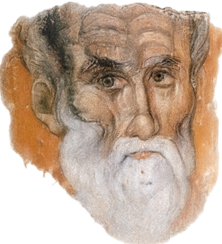Vocabulary of Orthodox Theology
Vocabulary of Orthodox Theology
A list of terms used in Orthodox writings.
By Georgios Abbot of the Holy Monastery of St. Gregorios On Mount Athos
Agios
(also written as "hagios", fem. "hagia"):
"Holly" or "Saint". Either from the Sanscrit cognate y-jati (from Protoindoeuropean yaj=to sacrifice) or y-jyah = worthy of reverence.
Apathia:
:
Dispassion. Passionlessness. The unrooting of the passions. Alternatively, a state in which the passions are exercised in accordance with their original purity and without committing a sin.
Askesis:
The effort or spiritual training waged by Christians to keep the commandments, to purify the heart from passions and to practice the virtues, together with prayer and related activities, so as to bring harmony between the body, soul and God.
Avaton:
The prohibition of women in Agion Oros. A mandated aspect of its autonomous status, which is enshrined in the constitution of Greece.
Diakonia, diakonima, diakonimata (pl.):
Service or ministration, in other words the assigned work tasks of a monk. [Anal. sanscr. "seva".]
Eros:
Evergetinos:
A collection of texts, primarily short stanzas and anecdotes from monastic life, illustrating the struggles and rewards of monastic life.
Faith:
See pistis
Gerontas, gerontes (pl.):
Also called Elder, or Staretz, an honorific appellation of a spiritually developed monk or a senior monk in a monastery, such as the abbot.
Gnosis:
Hagios (fem. hagia; see agios):Hesychia, hesychast, hesychastic:
Silence, stillness. Stilling of the thoughts, but not emptiness, whereby the nous may descend into the heart through the Jesus prayer. It is the inner attentiveness in prayer which brings the remembrance of God and the grace of the Holy Spirit.
Kelli, kellia (pl.):
A monk's cell in a monastery. Also, in Agion Oros, a dwelling, something like a farmhouse with a small chapel, where the monks pray and work out their salvation.
Koenovion, Cenobitic:
A monastery where all monks follow the same rules.
Lavra:
A monastery.
Logos:
The Greek word for both "word" and "reason" is variably nuanced with several meanings in context. In many cases, I tend to include that of the "Final Cause" (pl.: "final causes") in the Aristotelian sense**, rather than the sense of "reason" (as in reasoning and logic), in my own understanding of it [but then, I am neither a theologian nor a philologist].
Metanoia:
Often translated as repentance. Radical change of heart and mind, accompanied by meekness/humility.
Nepsis, neptic:
Nepsis is vigilance of the nous and watchfulness at the gates of the heart, so that every thought that moves in it can be controlled. Neptic is an adjective pertaining to the method used for nepsis.
Nous, noetic:
Often translated as "mind" or "mind in the heart". The highest faculty of man, through which, upon purification, he can contemplate God, and the inner essences of created things, by means of direct apprehension or spiritual perception. Noetic understanding is not intellectual, but it comes from immediate spiritual experience.
Pistis:
Faith. The modern idea of faith, based on Aquinas's differentiation of knowledge from blind belief, is not what is meant in the Orthodox tradition. Although it can be a component of what the fathers of the Church, such as Saint Maximos the Confessor, referred to as "introductory faith", it can only be considered an initial stage in our ascent towards knowledge and the Logos, which is true faith based on experience, a gift of God. At a higher stage, faith (gr. pistis) leads to noetic knowledge (gr. gnosis) that is founded on experience and completed by inspiration and, therefore, cannot be overthrown by reasoned argument. It changes the heart, it leads to substantial changes in being, it can move mountains, and it leads to salvation.
Saint:
See also agios:
Skete:
Typically similar in appearance to a small village, where kellia are built around a central Church. Each kelli performs its daily prayers independently except on Sundays and on feastdays, where theygather together in the main Church to worship.
Theanthropic
:
Pertaining to theanthropos, man-god.
Theoria:
(gr. "Theos" = God, "oro" = to view) The perception or vision of the nous, through which one attains spiritual knowledge. Depending on the level of spiritual growth, theoria has two main stages: it may be either of the inner essences or principles of created beings or, at a higher stage, of God Himself. Some times translated as "contemplation": 'Contemplation is a matter, not of verbal statements but of living experience. In pure prayer the Father, Son and Spirit are seen in their consubstantial unity' [from Archimandrite Sophrony: His Life is Mine translated by Rosemary Edmonds, St. Vladimir's Seminary Press, Oxford, 1977]
Theoritikos:
An individual who has accomplished theoria.
Theosis:
The deification of man. According to the Orthodox tradition, man's purpose in life is to achieve union with God, and to become god by grace. Self-realization. The acquisition of the Holy Spirit.
THE NEPTIC AND HESYCHASTIC CHARACTER OF ORTHODOX ATHONITE MONASTICISM By Archimandrite Georgios Abbot of the Holy Monastery of St. Gregorios On Mount Athos
https://greekorthodoxchurch.org/neptic_monasticism.html
Today's:
- About Athos Forum
- Ask a question about Athos
- The caique from Lavra
- Athos monasteries
- Skete of Prophet Elias
- Saint Panteleimon Monastery
- Digital libraries on Athos
- Mount Athos (Agion Oros) Guide
- The Mount Athos Repository-images
- The caique from Lavra - a review
- Athos monasteries bibliography
- Permit to enter Mt Athos-diamonitirion
- Vatopedi Monastery
- Iviron Monastery
- Pantokratoros monastery
- Who were the Kollyvades
- Contact
- Osiou Grigoriou Monastery
- Important links on Athos
- Mt Athos Travel Guide
All time:
- About Athos Forum
- Ask a question about Athos
- The caique from Lavra shipwrecked
- The caique from Lavra - a review
- Athos monasteries
- The caique from Lavra
- Konstamonitou Monastery
- Feedback. Suggestions
- Saint Panteleimon Monastery
- Vatopedi Monastery
- Permit to enter Mt Athos-diamonitirion
- Agiou Pavlou Monastery
- Contact
- Digital libraries on Athos
- Megisti Lavra Monastery
- Stavronikita Monastery
- Karakallou Monastery
- Simonos Petra
- Kekragarion in Athonite psaltic Art
- Iviron Monastery
Last viewed:
- Ask a question about Athos
- About Athos Forum
- Notable Cantors (Psaltes) of Athos
- Skete Agiou Andrea-Serai
- Sanguine blood relations ail Athos
- The Library of Megisti Lavra
- Mount Athos News-Agion Oros
- Requiem for Athos Orthodoxy
- ΣΕ ΥΜΝΟΥΜΕΝ-TE LAUDAMUS
- The caique from Lavra
- Important links on Athos
- The monasteries of Athos and Orthodox America-an overview
- The skete of Kafsokalyvia
- Konstamonitou Monastery
- Should women be allowed to visit Athos?
- Historical images of Athos
- Who is athosforum.org
- Xenophontos Monastery
- The caique from Lavra shipwrecked
- Skete of Prophet Elias

 /
/






Add new comment